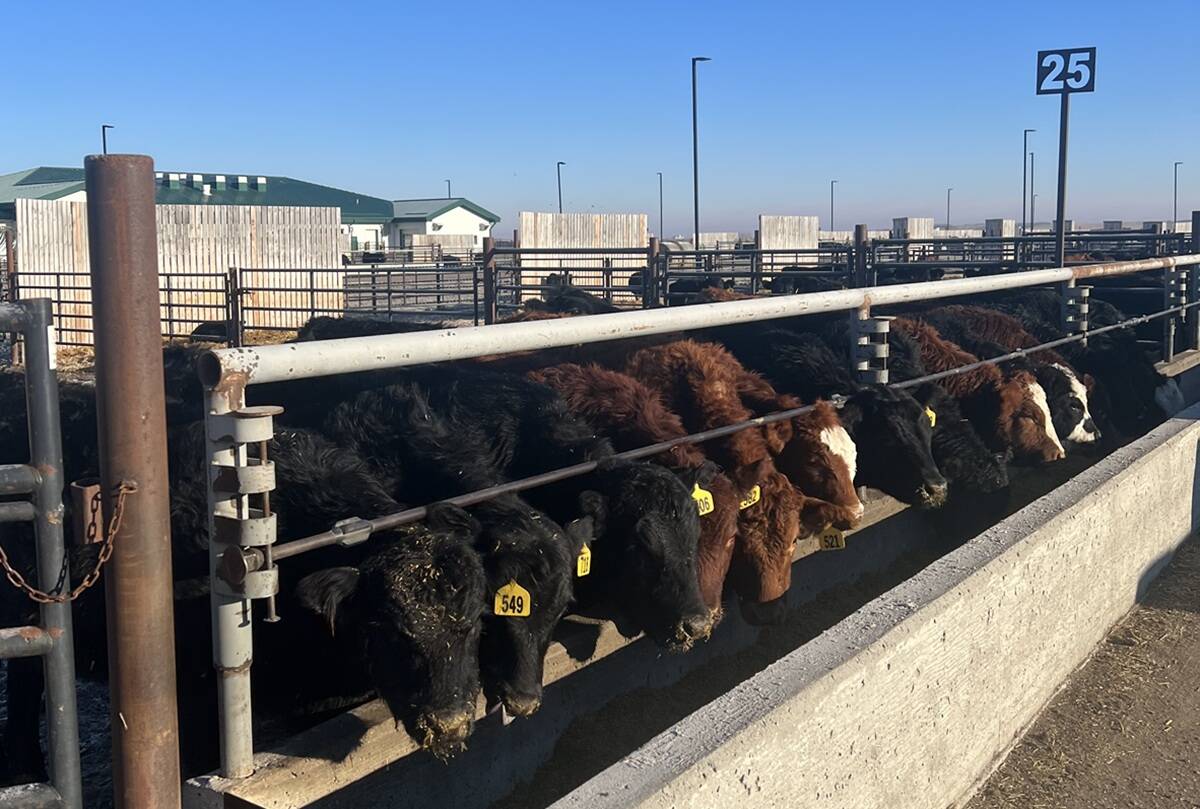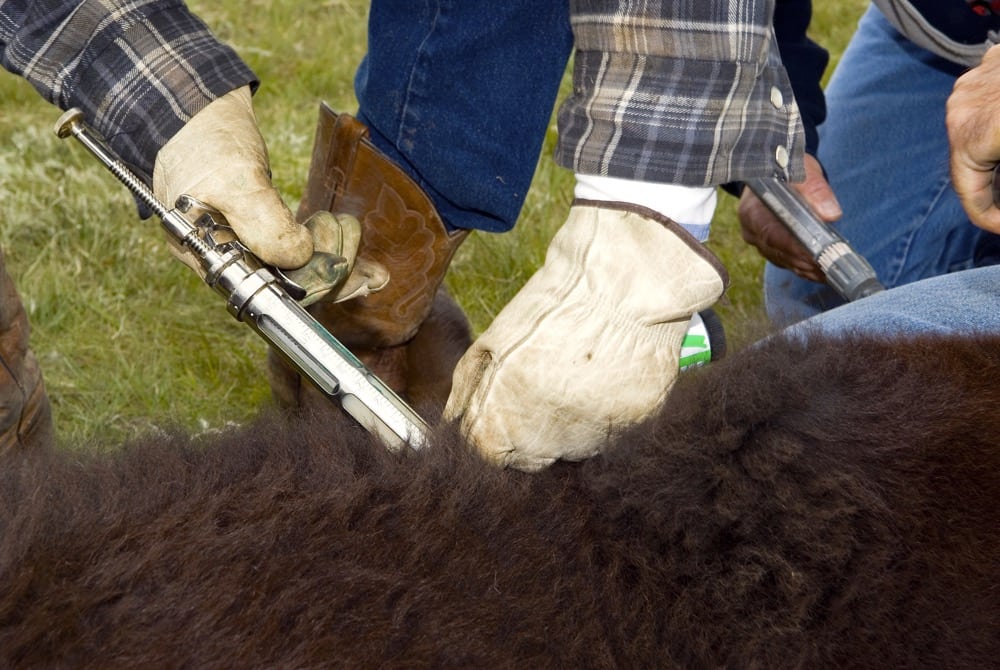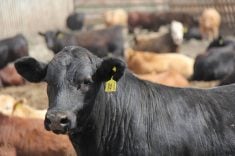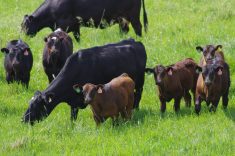Vaccines have been a valuable tool to protect cattle health in North America, ever since the first blackleg vaccine was developed over a century ago. Ensuring the health of Canadian cattle is critical to maintaining consumer confidence, access to global livestock and beef markets and producer profitability.
Vaccines help prevent infection and disease caused by viruses or bacteria. Over time, more effective vaccine technologies have been developed. The earliest vaccines used killed viruses and bacteria to stimulate the immune system. Newer modified-live vaccines (MLV) use weakened viruses or bacteria that cannot cause disease but provide long-lasting disease protection. In the future, messenger ribonucleic acid (mRNA) vaccines may be approved for use in Canadian cattle.
No mRNA vaccines are approved for use in beef cattle in North America today. However, mRNA vaccines are being tested for viral diseases such as foot-and-mouth disease and lumpy skin disease (primarily found in warm, tropical climates). An mRNA vaccine acts like an instruction manual, teaching the cells how to make a protein. This triggers the immune system to create antibodies which help to fight off an infection faster if the actual virus or bacteria is encountered in the future.
Read Also

Managing newly received calves in the feedlot
What should cattle feeders focus on after calves arrive at the feedlot?
The main benefit of mRNA vaccines is that they can be developed quickly — as soon as the variant of the disease-causing virus or bacteria is known. This provides the exact instructions to the immune system for a targeted response. This technology contributed to the quick development of COVID-19 vaccines. Although the apparent speed of development led many people to question their safety, mRNA vaccine delivery systems, as well as their safety and effectiveness, have been studied for over 30 years.
Many procedures are in place to ensure vaccine safety. Before a new vaccine is licensed for use in Canada it must also be shown to be pure, potent, safe and effective when used in the target species according to the manufacturer’s label recommendations. The licensing submission must also contain data demonstrating that the product can be manufactured and used without adversely affecting animal health, human health, food safety or the environment. In Canada, veterinary biologics (which include vaccines) are regulated by the Canadian Food Inspection Agency. The veterinary biologics regulatory program is administered by the Canadian Centre for Veterinary Biologics, which oversees the manufacturing, testing, labelling, import, export, distribution and use of vaccines for domestic livestock.
Potential uses for mRNA vaccine in beef
Although there are no mRNA vaccines approved for use in beef cattle, an mRNA-based vaccine technology (SEQUIVITY®) is now available in the U.S. for use in swine. This vaccine prevents a broad range of different viral infections and was fully tested and approved for safety before being licensed for use.
There are specific situations in which mRNA vaccines may provide an invaluable tool in protecting the health of the Canadian cattle herd. For example, if foot-and-mouth disease ever reappeared in Canada, an mRNA vaccine could be an effective tool to rapidly contain and eradicate it. There are seven distinct types of the virus that cause foot-and-mouth disease, and over 60 subtypes, with new subtypes occasionally developing sporadically. A mRNA vaccine could be custom-made within days to target the specific strain of foot-and-mouth causing the outbreak. Along with other control measures, the ability to rapidly vaccinate cattle in an affected region of the country could reduce the risk of disease transmission and ultimately the number of animals that would be euthanized.
It is unlikely that vaccines currently used for common cattle diseases will be replaced with mRNA vaccines. This is because:
- A major challenge with mRNA vaccines is that the mRNA molecule is extremely unstable and only survives for a few minutes or hours before being degraded by enzymes present in all body fluids and even on our skin.
- The short immune response duration, and the specificity of immune responses to a single viral protein (for example, not necessarily protecting against variants), creates substantial limitations for this technology. Most current vaccines offer protection for at least one year and cross-protection against multiple strains, where mRNA vaccines would require more frequent booster injections and possibly frequent redesign to protect against each new viral variant.
- As Canadian cattle are raised on pastures or in large group pens, increasing the frequency of animal handling as well as the current challenges of storing, transporting and handling mRNA vaccines (i.e., transport, storing at -80 C), use of mRNA vaccines would not be simple for Canadian beef production.
Like all vaccines for beef cattle, mRNA vaccines will have a required withdrawal period prior to processing. As mRNA has a short life, it will not remain in the body for long or produce long-term effects. An mRNA vaccine does not genetically modify the animal, nor pass from one animal to another. The mRNA vaccine is not passed into meat or any other animal product.
The next few years will certainly see intensified interest and research into the use of mRNA vaccines in livestock. It is important to remember that many of the diseases we vaccinate beef cattle for can have devastating financial consequences in terms of treatment costs, mortality and reproductive losses. Current and future vaccines will play an important role in reducing economic losses and improving animal welfare — goals that are vital to the success of the Canadian beef industry.
Dr. Philip Griebel is head of the pathogenomics research group at the Vaccine and Infectious Disease Organization and a professor at the University of Saskatchewan in the School of Public Health. Griebel is also the Canada Research Chair in Neonatal Mucosal Immunology.
















